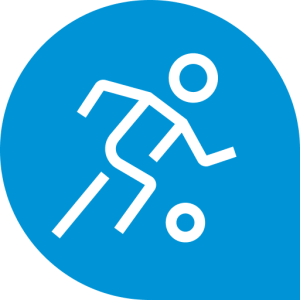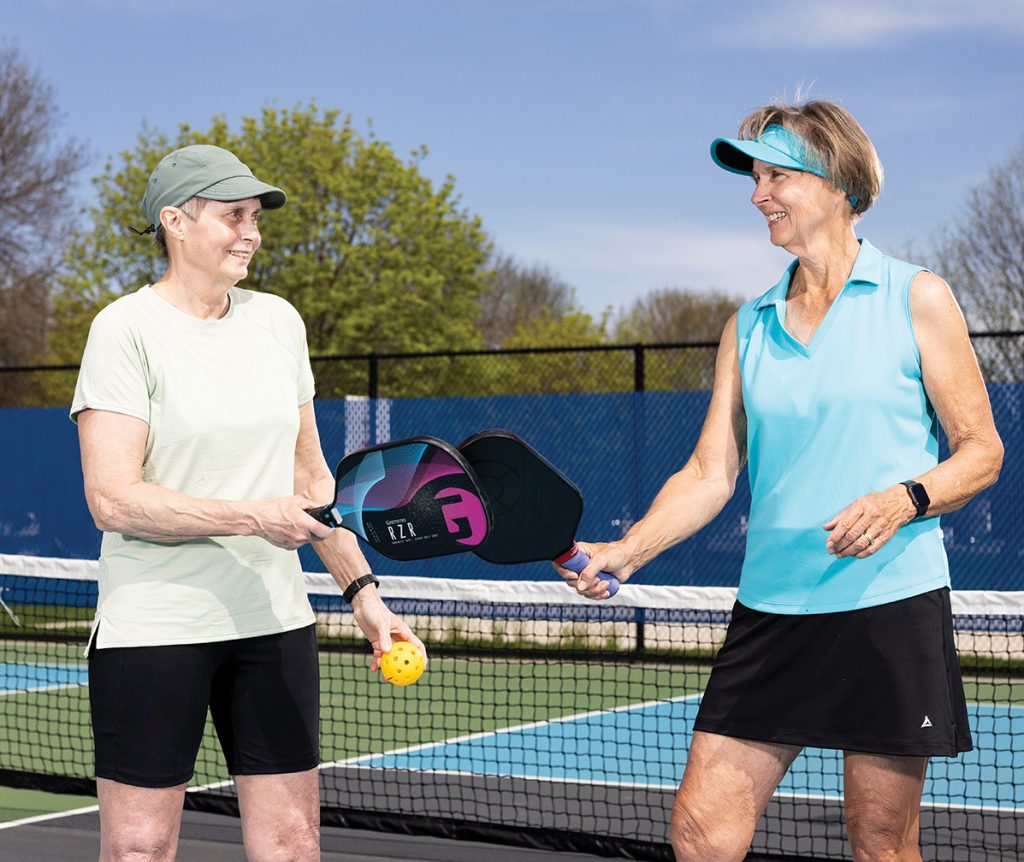Marty Hull, 70, sits in her south Minneapolis home, telling the story of her highly active life — tennis, basketball, volleyball, rowing, racquetball and badminton are a few sports she has played through the years.
But she focuses on one sport that she took up more recently. The sport with a funny name, that she credits for keeping her social and active throughout the pandemic: pickleball.
Pickleball kept Hull moving while she was battling joint pain caused by arthritis, and it helped her safely interact with others during the pandemic. It’s no surprise that pickleball, and the community she’s built because of it, have become an important part of her life.
“I really missed competition,” Hull says. “I couldn’t play basketball or row competitively anymore. Pickleball is the perfect sport because you get to compete every time you play.”
Hull also entered several pickleball tournaments, where she met and befriended pickleball partner Donna Powell. Like Hull, Powell prioritizes physical activity. Both women have a competitive streak and decided to compete together in doubles not long after they met.
The duo is among a growing number of older adults who have taken up the sport to safely stay in shape and stay connected with others.
Pickleball basics
With indoor and outdoor courts all over the state, pickleball clubs and a large Minnesota pickleball Facebook group, you’ve likely heard of the sport by now. If you haven’t, it’s played with a paddle, a small Wiffle ball, a net, and two or four players.
Pickleball is similar to tennis and other racket sports. The rules are easy enough — the serving side must serve the ball diagonally, the ball is hit back and forth until someone faults, and the winner is the first player or team who scores 11 and leads by at least two points.
The badminton-size court and short paddle make it a perfect second act for older, active adults. The smaller court size means less running back and forth — particularly true if you’re playing doubles — and the short paddle causes less joint stress on the shoulder and elbow compared to a tennis or badminton racket.
This low-impact sport is the perfect way to get cardio exercise, build strength and socialize.
Dr. Heather LaBere, a family medicine physician at North Memorial’s New Hope clinic, says older adults should aim for 30 minutes of low-impact exercise at least five days per week, but there’s flexibility within those recommendations.
“Really, it’s about the minutes,” Dr. LaBere says. “The American Heart Association recommends a minimum of 150 minutes of moderate activity per week, and you can break that down however works best.” Routine activity yields physical benefits like improved cardiovascular strength and mobility — but that’s not all.
“What it comes down to is improved overall quality of living and daily functioning,” Dr. LaBere says. “Older adults who are routinely active drastically reduce their risk of falls and increase their ability to maintain independence.”
Activities that are enjoyable and socially engaging — like pickleball — make it easier for people to get in those recommended exercise intervals, she adds.
Pickleballing through the pandemic
Before the COVID-19 pandemic, Hull and Powell played pickleball indoors and outdoors at a variety of locations — Roseville, Apple Valley, Eden Prairie and Richfield. They were able to play in so many locations thanks to a health plan benefit.
“The SilverSneakers® program is totally wonderful,” Hull says. “You get to go to all of these different gyms.”
The women still use the benefit, but the last couple of years have looked different. The pandemic hit Minnesota just as Powell was returning from her retirement home in Arizona. She and Hull had plans to train together for a tournament in May, but it was canceled due to restrictions.
For many people who play pickleball, it’s not just a great source of exercise, it’s also a primary way to socialize. So when the courts were shut down during this time, several people lost their means of physical activity and socialization.
When the outdoor courts opened up, Hull and Powell formed a bubble, and they continued to play. They had a foursome that met frequently, and that’s how they kept going during COVID.
Being able to play pickleball not only provided a safe way to socialize and exercise outdoors, but it also gave Hull and Powell something to focus on and look forward to.
“When Donna came back from Arizona, we did a lot of singles, and we did a lot of drilling, which was good for our games,” Hull says.
Dr. LaBere encourages social activities, like pickleball, because they have several health benefits — especially after enduring the past couple years.
“Feeling socially isolated can be very depressing,” she says. “By having a social group, like this pickleball group, you get accountability to show up and play. Camaraderie and friendship are beneficial to everything — not just for mood, but for an individual’s sensation of happiness and overall health.”
Arthritis pain

The most effective way to reduce joint pain and stiffness associated with arthritis is daily physical activity.
Overcoming arthritis
Although staying active has always been a priority for both women, it hasn’t always been easy. Hull started experiencing multiple joint problems, which made activities, including pickleball, difficult to keep up with.
Her joint issues started in her fingers and wrists and traveled to her shoulders. At one pickleball tournament, her shoulders were so bad she almost couldn’t play the second day.
“I felt like I was in my late nineties instead of in my sixties,” she recalls. She ended up going to see her doctor, and she learned that she had rheumatoid arthritis, an autoimmune disease that attacks the joints.
The new diagnosis meant staying active was an even more important priority for Hull.
Physical activity maintains your mobility and strength, and it can actually ease some of the joint pain, Dr. LaBere says.
“With rheumatoid arthritis,” she adds, “activity is often part of the non-pharmacologic treatment course. Staying active greatly reduces the fatigue that many people with rheumatoid arthritis have.”
Rebounding from surgery
To help with her arthritis, Hull recently underwent two hip replacement surgeries. So for now, her pickleball paddle is packed away, but as soon as she’s cleared to play again, she will.
And for her, the surgeries are no excuse to stop being active. She has spent much of her recovery time walking with friends.
Powell overcame an operation of her own — a meniscus surgery. She has worked closely with a physical therapist and an orthopedic doctor in order to heal properly, but she emphasizes physical activity as a way to avoid arthritis in the future.
For both women, surgeries and joint issues won’t stop them from staying active, and pickleball has been an important way that they have prioritized their physical and social activity.
“Being retired, you need to get out of the house,” Powell says. “And pickleball, it gives you goals and something to work towards. It gives you a sense of purpose.”
Did you know?

Social connections reduce your risk of depression, high blood pressure and an unhealthy Body Mass Index (BMI).


